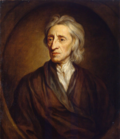Alfred North Whitehead
Alfred North Whitehead, OM (15 February 1861 – 30 December 1947) was an English mathematician who became a philosopher. He was born in Ramsgate, Kent, and died in Cambridge, Massachusetts, USA. He wrote on algebra, logic, foundations of mathematics, philosophy of science, physics, metaphysics, and education. He is the co-author, with Bertrand Russell, of the important Principia Mathematica.[1]
Alfred North Whitehead Media
Whewell's Court north range at Trinity College, Cambridge. Whitehead spent thirty years at Trinity, five as a student and twenty-five as a senior lecturer.
Bertrand Russell in 1907. Russell was a student of Whitehead's at Trinity College, and a longtime collaborator and friend.
Richard Rummell's 1906 watercolor landscape view of Harvard University, facing northeast. Whitehead taught at Harvard from 1924 to 1937.
Eckhart Hall at the University of Chicago. Beginning with the arrival of Henry Nelson Wieman in 1927, Chicago's Divinity School become closely associated with Whitehead's thought for about thirty years.
John Locke was one of Whitehead's primary influences. In the preface to Process and Reality, Whitehead wrote: "The writer who most fully anticipated the main positions of the philosophy of organism is John Locke in his Essay."
Philosopher Nicholas Rescher. Rescher is a proponent of both Whiteheadian process philosophy and American pragmatism.
Theoretical physicist David Bohm. Bohm is one example of a scientist influenced by Whitehead's philosophy.
References
- ↑ Lowe, Victor 1985/90. Alfred North Whitehead: the man and his work. 2 vols, Baltimore: The Johns Hopkins Press.
+{{{1}}}−{{{2}}}








